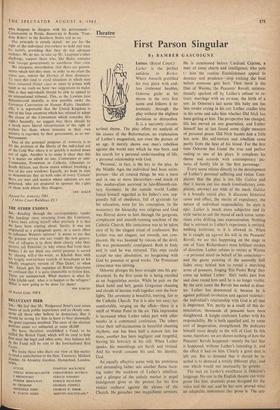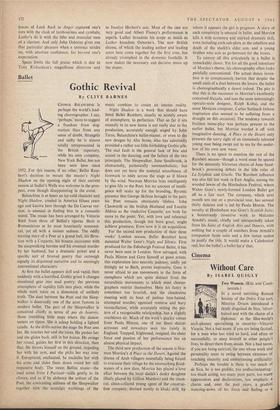Theatre
First Parson Singular
By BAMBER GASCOIGNE
Personal,' in fact, is the key to the play. In the Middle Ages the individual had been unim- portant—like all created things, he was a mere unit in one or more hierarchies—and much of this medirevalism survived in late-fifteenth-cen- tury Germany. In the outside world Luther found himself regarded as his 'father's son, sup- posedly full of obedience, full of gratitude for his education, even for his conception. In the monastery the hierarchy was religious and God was filtered down to him through the gorgeous, complacent and smooth-running machine of the Catholic Church. His conscience was to be taken care of by the elegant ritual of confession. But Luther was not elegant, not smooth, not com- placent. He was haunted' by visions of the devil. He was permanently constipated. Both in body and in soul he was tortured. This man could accept no easy absolution, no bargaining with God by penance or good works. The Protestant conscience was stirring.
Osborne plunges his hero straight into his pre- dicament. In the first scene he is being enrolled as an Augustinian novice. While he puts on the black habit and belt, gentle Gregorian chanting and clouds of incense waft together over the foot- lights. The ceremony is beautiful, moving, fair to the Catholic Church. Yet it is also too easy, too comfortable, verging on the effete—there is a whiff of Walter Pater in the air. This impression is increased when Luther takes part with other monks in a communal confession. The others voice their self-accusations in beautiful chanting rhythms; one has been half a minute late for mass, another has been negligent and forgetful, leaving his breviary in his cell. When Luther speaks, his mumblings are harsh and twisted. And his words concern his soul, his identity, God.
An ,equally effective scene with his ambitious and demanding father sets another flame burn- ing under the cauldron of Luther's rebellion, and a glimpse of the unholy market in papal indulgences gives us the pretext for his first violent outburst against the • abuses of the Church. He preaches two magnificent sermons. He is summoned before Cardinal Cajetan, a man of some charm and intelligence, who puts him the routine Establishment appeal to decency and prudence—stop rocking the boat before someone gets hurt. Then there is the Diet of Worms; the Peasants' Revolt, uninten- tionally sparked off by Luther's refusal to re- tract; marriage with an ex-nun; the birth of a son. In Osborne's last scene this baby son has lain awake crying in his cot. Luther cradles him in his arms and asks him whether Old Nick has been getting at him. The perspective has changed, life has moved on one generation, and Luther himself has at last found some slight measure of personal peace. Old Nick haunts him a little less now. His self-torture and rebellion came partly from the heat of his blood. For the first time Osborne has found the true and perfect ending to one of his plays. It completes his theme and accords with contemporary pic- tures of family life in `the first parsonage.'
Every scene relates directly to the development of Luther's personal suffering and vision. Com- plaints that the play is too like Galileo and that it leaves out too much (contradictory com- plaints, anyway) are wide of the mark. Galileo is a broadly social play. It discusses historical cause and effect, the merits of expediency, the nature of individual responsibility. Its style is epic. Luther is much more subjective and its style varies to suit the mood of each scene, some- times even drifting into expressionism. Nothing that is relevant to Luther's experience is omitted, nothing irrelevant to it is allowed in. When he is caught up against his will in the Peasants' Revolt, we see this happening on the stage in one of Tony Richardson's most brilliant strokes of direction. Luther,refuses to retract at Worms —a personal stand on behalf of his conscience— and the gauze painting of the assembly hall fades away behind him to reveal a marching army of peasants. Singing Tin Fester Burg' they come up behind Luther: their ranks pass him and close round him until he is no longer visible. By the next scene the Revolt has ended in disas- ter. Luther has denounced it, because he is against political revolution and against violence: the individual's relationship with God is all that is important. Yet, partly as a result of this de- nunciation, thousands of peasants have been slaughtered. A knight confronts Luther with his responsibility. He is both appalled and, by some sort of desperation, strengthened. He dedicates himself more deeply to the will of God. In this scene, therefore, we are shown nothing of how the Peasants' Revolt happened—merely the fact that it happened, without Luther's intending it, and the effect it had on him. Clearly a great deal is left out. But to demand that it should be in- serted is to demand a totally different play, and one which would not necessarily be greater.
The seal on Luther's excellence is Osborne's language. No one in the English theatre can write prose like him, dramatic prose designed for the voice and the ear, and he has now proved what an adaptable instrument this prose is. The sen- tences of Look Back in Anger captured one's ears with the clash of tambourines and cymbals; Luther's do it with the lithe and muscular ease of a clarinet. And only John Osborne gives one that particular pleasure when a sentence strides on, with absolute confidence, far beyond one's expectation.
Space limits the full praise which is due to Tony Richardson's magnificent direction and to Jocelyn Herbert's sets. Most of the cast are very good and Albert Finney's performance is superb. Luther broadens his scope as much as Luther broadens Osborne's. The new British drama, of which the leading author and leading actor here come together for the first time, has already triumphed in the domestic foothills. It now makes the necessary and decisive move up the slopes.



































 Previous page
Previous page